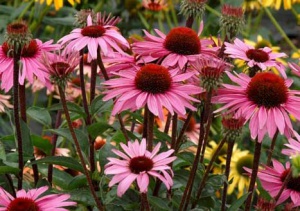Echinacea
Contents
Habitat & Description
Echinacea can be found growing anywhere throughout North America, in prairies, plains and open woodlands. It's a perennial herb, with tall stems and flowers that range from pink to purple, which have a central cone (seed head) that can be purple or browish in color.
For medicinal purposes, mostly the roots are used. However, the leaves, stems and flowers are often used either fresh or dried in teas and juice extracts.
Constituents & Actions
Echinacea contains essential oils, polysaccharides (inulin), polyacetylenes, betain, glycoside, sesquiterpenes and caryophylene. Also found in this herb; copper, iron, tannins, protein, fatty acids, vitamins A, C and E.
Echinacea is an anti-microbial destroys or prevents the growth of micro-organisms), immunomodulator (regulates the immune system) , anti-catarrhal (eliminates mucus conditions), alterative (cleanser, aids in removal of waste products), blood purifier and antibiotic.
Indications
Echinacea is most frequently used for boosting the immune system during the cold and flu season, as it's been known to decrease the frequency, duration and severity of colds and flu, it's also helpful in treatment of ear and sinus infections. It is a very popular remedy for helping the body rid itself of many microbial infections and bacterial or viral attacks.
The herb Echinacea is especially useful for infections of the upper respiratory tract, such as laryngitis and tonsillitis. Glycosides from the roots have mild activity against throat infections.
Echinacoside found in this herb is most active, with 6 parts equal to 1 unit of penicillin. It can reduce the rate of growth and reproduction of trichomonas vaginalis, also is effective in halting the recurrence of candida albicans infections. When combined with Yarrow or Bearberry, it will effectively stop the progression of cystitis.
Preparation & Dosage
Decoction: 1-2 teaspoons of root in 1 cup of water, bring to a boil, and simmer 10-15 minutes, drink 3x's per day. 1-4ml of herbal tincture should be given three times daily.
Side Effects
Those who are allergic to flowers in the daisy family must use caution when taking Echinacea. Anyone who is taking prescription medications should consult with their doctor before using this herb, it may reduce the effectiveness of certain drugs.
